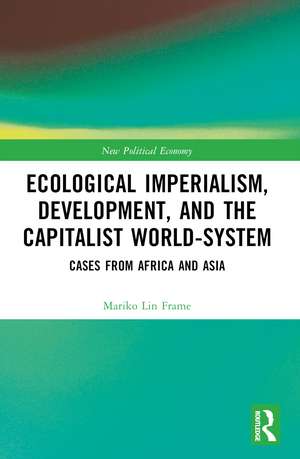Ecological Imperialism, Development, and the Capitalist World-System: Cases from Africa and Asia: New Political Economy
Autor Mariko Lin Frameen Limba Engleză Paperback – 29 iul 2024
Drawn from extensive theoretical, historical, policy, and empirical research, as well as fieldwork in Africa and Asia, this book examines the crucial characteristics of the capitalist world-system and how it enables and drives ecological imperialism. Neoliberal globalization has allowed for capital’s unfettered access to and exploitation of Nature across the planet, and neoliberal development policies have reinforced a contemporary form of ecological imperialism where the environments of the Global South are enclosed and exploited, and local communities are dispossessed of their land and livelihoods. Simultaneously, resources from the Global South are funneled to the Global North in the form of consumer goods and ecologically unequal exchange, while the profits from those resources are siphoned away to transnational corporations, financiers, and government elites. This work traces the historical development of free market policies, while also paying special attention to the role of Northern international financial institutions, emerging economies (the semi-periphery), and the often-hidden role of international finance in ecological imperialism.
This volume will be of keen interest to scholars and students of political economy, critical development studies, environmental sociology, and political ecology.
| Toate formatele și edițiile | Preț | Express |
|---|---|---|
| Paperback (1) | 387.83 lei 6-8 săpt. | |
| Taylor & Francis – 29 iul 2024 | 387.83 lei 6-8 săpt. | |
| Hardback (1) | 895.46 lei 6-8 săpt. | |
| Taylor & Francis – 13 oct 2022 | 895.46 lei 6-8 săpt. |
Din seria New Political Economy
-
 Preț: 429.44 lei
Preț: 429.44 lei - 18%
 Preț: 145.24 lei
Preț: 145.24 lei -
 Preț: 438.14 lei
Preț: 438.14 lei -
 Preț: 169.79 lei
Preț: 169.79 lei -
 Preț: 442.89 lei
Preț: 442.89 lei -
 Preț: 210.70 lei
Preț: 210.70 lei - 16%
 Preț: 247.87 lei
Preț: 247.87 lei -
 Preț: 416.12 lei
Preț: 416.12 lei -
 Preț: 194.67 lei
Preț: 194.67 lei -
 Preț: 466.45 lei
Preț: 466.45 lei -
 Preț: 463.58 lei
Preț: 463.58 lei - 24%
 Preț: 323.17 lei
Preț: 323.17 lei -
 Preț: 277.69 lei
Preț: 277.69 lei -
 Preț: 367.08 lei
Preț: 367.08 lei -
 Preț: 278.84 lei
Preț: 278.84 lei -
 Preț: 411.98 lei
Preț: 411.98 lei - 18%
 Preț: 1000.27 lei
Preț: 1000.27 lei -
 Preț: 194.38 lei
Preț: 194.38 lei -
 Preț: 431.73 lei
Preț: 431.73 lei -
 Preț: 277.87 lei
Preț: 277.87 lei
Preț: 387.83 lei
Nou
Puncte Express: 582
Preț estimativ în valută:
74.21€ • 79.36$ • 61.88£
74.21€ • 79.36$ • 61.88£
Carte tipărită la comandă
Livrare economică 17 aprilie-01 mai
Preluare comenzi: 021 569.72.76
Specificații
ISBN-13: 9781032312101
ISBN-10: 1032312106
Pagini: 224
Ilustrații: 42
Dimensiuni: 156 x 234 mm
Greutate: 0.32 kg
Ediția:1
Editura: Taylor & Francis
Colecția Routledge
Seria New Political Economy
Locul publicării:Oxford, United Kingdom
ISBN-10: 1032312106
Pagini: 224
Ilustrații: 42
Dimensiuni: 156 x 234 mm
Greutate: 0.32 kg
Ediția:1
Editura: Taylor & Francis
Colecția Routledge
Seria New Political Economy
Locul publicării:Oxford, United Kingdom
Public țintă
Academic, Postgraduate, and UndergraduateCuprins
Preface Chapter 1: The Ecological Aspect of Imperialism Chapter 2: Neoliberal Development and Ecological Imperialism Chapter 3: Africa in the Global Ecology: The Eco-Neocolonial Relations of Trade and Foreign Investment Chapter 4: Tanzania: The Role of the State from African Socialism to Eco-Neocolonialism Chapter 5: Emerging Economies in the Global Ecology: Semi-Peripheral and Regional Sub-Imperialism Chapter 6: International Finance in the Global Ecology Chapter 7: The Financing of Palm Oil Chapter 8: Climate Negotiations, UN Sustainable Development Goals, and Ecological Imperialism
Notă biografică
Mariko Lin Frame is an Assistant Professor of Economics at Merrimack College, USA, where she teaches courses related to the environment, development, and the global economy. She has lived, researched, and worked extensively in East Africa and Asia.
Descriere
Drawn from extensive theoretical, historical, policy, and empirical research, as well as fieldwork in Africa and Asia, this book examines the crucial characteristics of the capitalist world-system and how it enables and drives ecological imperialism.
